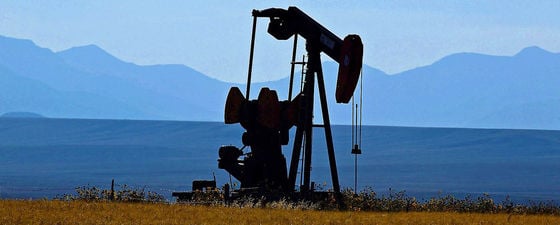“This house believes that ‘Peak Oil’ is no longer a concern.” This was the motion put to a packed room of several hundred delegates at the 7th Petroleum Geology Conference (PGC7) in London earlier this year.
The audience came from a wide range of geoscience disciplines in the oil and gas industry, representing academe, service and technology industries as well as oil companies of all shapes and sizes. The comments and opinions of this diverse group could therefore be considered an accurate reflection of the feelings of the industry on this contentious subject.
Traditional debate
 Image: Association for the Study of Peak Oil and Gas (ASPO)The discussion, the first of three to be held during the Conference, was conducted as a traditional debate. David Jenkins, formally Chief Technology Advisor for BP and now a director of BHP Billiton, proposed the idea, while Jeremy Leggett, well-known environmental campaigner and Chairman of alternative energy company Solar Century, presented the opposing view. The topic was then opened to floor discussion before being put to the vote.
Image: Association for the Study of Peak Oil and Gas (ASPO)The discussion, the first of three to be held during the Conference, was conducted as a traditional debate. David Jenkins, formally Chief Technology Advisor for BP and now a director of BHP Billiton, proposed the idea, while Jeremy Leggett, well-known environmental campaigner and Chairman of alternative energy company Solar Century, presented the opposing view. The topic was then opened to floor discussion before being put to the vote.
Both protagonists expressed themselves clearly and elegantly, and the debate revealed that there are a number of different definitions for the emotive phrase ‘Peak Oil’. It was originally used to describe the maximum production of oil in any basin, field, or well before the rate of extraction declines, but is now more commonly used in terms of global production and resource.
David Jenkins pointed out that the motion was about whether we should be concerned about Peak Oil, not when it did or will happen. To him, any postulated date for Peak Oil is irrelevant, as the timing of a theoretical peak is not the main concern. The important issue is how the industry and the world will cope with the anticipated and inevitable fluctuations in price and production.
As the moderator, Julian Rush, pointed out, the debate is wider than simply the narrow issue of supply and demand. “This is no longer a debate based on the assumption that resources are infinite, and demand enduring and inflexible, but one coloured by the realisation that Peak Oil must happen.”
Over-optimistic asset estimates
It was obvious that the speakers fundamentally disagreed on the state of the world’s resources.
“There is no near-term resource peak for oil, gas or coal,” David Jenkins stressed. Citing the 2005 International Energy Agency’s (IEA) World Energy Outlook, he pointed out that production of crude oil actually peaked in 2005, and yet at today’s rate of consumption we have sufficient hydrocarbons for 100 years. He went on to say “the question of whether or when we experience production peaks is fundamentally about market forces and definitely not related to a resource peak.” He gave as an example the production peak experienced in 2008, caused by price increases resulting from speculation, which lead to an immediate cut back in demand, similar to that experienced in the oil price rise of 1980. In his opinion, a future population will respond equally rapidly to price signals and change its energy consumption habits accordingly.
By contrast, Jeremy Leggett believes that the oil industry has “lapsed into a culture of over-exuberance, both about remaining oil reserves and about the industry’s ability to deliver to the market even if enough resources exist.” He pointed out that, in addition to over-optimistic asset estimations by oil companies, many countries, particularly those in OPEC, habitually exaggerate their reserve figures (see GEO ExPro 2007, Vol. 4, No 3, “Do OPEC Reserves Figures Matter?”). Yet a recent EIA study of the world’s existing oil reserves revealed that fields currently in production are running out alarmingly fast.
In Jeremy Leggett’s opinion, the industry is no longer equipped to deliver on its production promises. Giant fields are not being discovered at the rate in which they were in past decades; lead times to bring a field to production are longer, partly due to the complex nature and difficult environment of many recent discoveries; there is a lack of investment in infrastructure; the loss of skilled personnel has resulted in the ‘human resources time bomb’. These are all issues which will “synergise to compound the Peak Oil crisis, gravely impairing society’s collective ability to respond.” In essence, he does not believe either the ‘price-mechanism’ assumption that higher prices will lead to increased exploration and discoveries, or that consumption is easily adapted.
“Global oil production will begin to decline early in the next decade”
Crisis – or famine?
David Jenkins believes, however, that we will adjust to the alterations in lifestyle demanded by changes in energy supply. He agrees that we need to change our reliance on liquid petroleum, and that “decarbonising energy because of the fear of climate change…… would have the effect of forcing such change.” Ways to replace the petrol-fuelled internal combustion engine with alternative fuels or methodologies are technically feasible, which could, in his opinion, eliminate further growth in global demand for oil. Not necessarily a cheap option, but “the world needs to become accustomed to expensive energy,” as he says. In this new world order, “Peak Oil clearly becomes an artefact of a prior economic world, and no longer a concern.”
Jeremy Leggett is not so optimistic about the future. The UK Industry Taskforce on Peak Oil and Energy Security (ITPOES), involving companies from across a wide spectrum of activities, recently presented evidence that total global oil production will begin to decline early in the next decade – hitting an unprepared world as it starts to emerge from the present financial crisis. Will we automatically find methods to cope which will be appropriate for and acceptable to the whole global community? “In possibly less than 10 years time, will we be facing an energy crisis – or an energy famine?”
As Julian Rush pointed out when summing up, the underlying question is “can Peak Oil be managed so there is a smooth transition to replacement technologies or fuel sources with urgency, but without excessive societal disruption?” As oil prices rise, will world leaders be able to instigate policies accelerating the switch to a low-carbon economy and infrastructure? Or will oil prices mean that we will be left with difficult choices about unaffordable lifestyles?
The vote…
When the discussion was thrown open to the floor, a number of interesting and pertinent points were made. The majority expressed the opinion, in various ways and for different reasons, that we ignore the issues surrounding Peak Oil at our peril. For the most part, the debate was at the global, rather than oil industry level. It was therefore no surprise that when put to the vote, the motion was heavily defeated. ‘Peak Oil’ is clearly an important issue to leading geologists in the industry.
The house believes that “Peak Oil” is still a concern – for the planet more than the oil industry.




